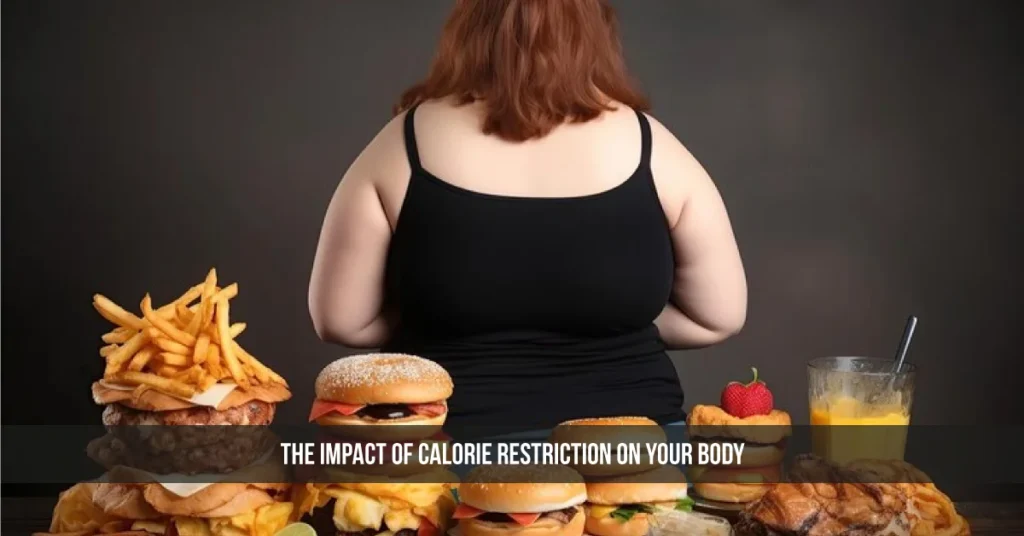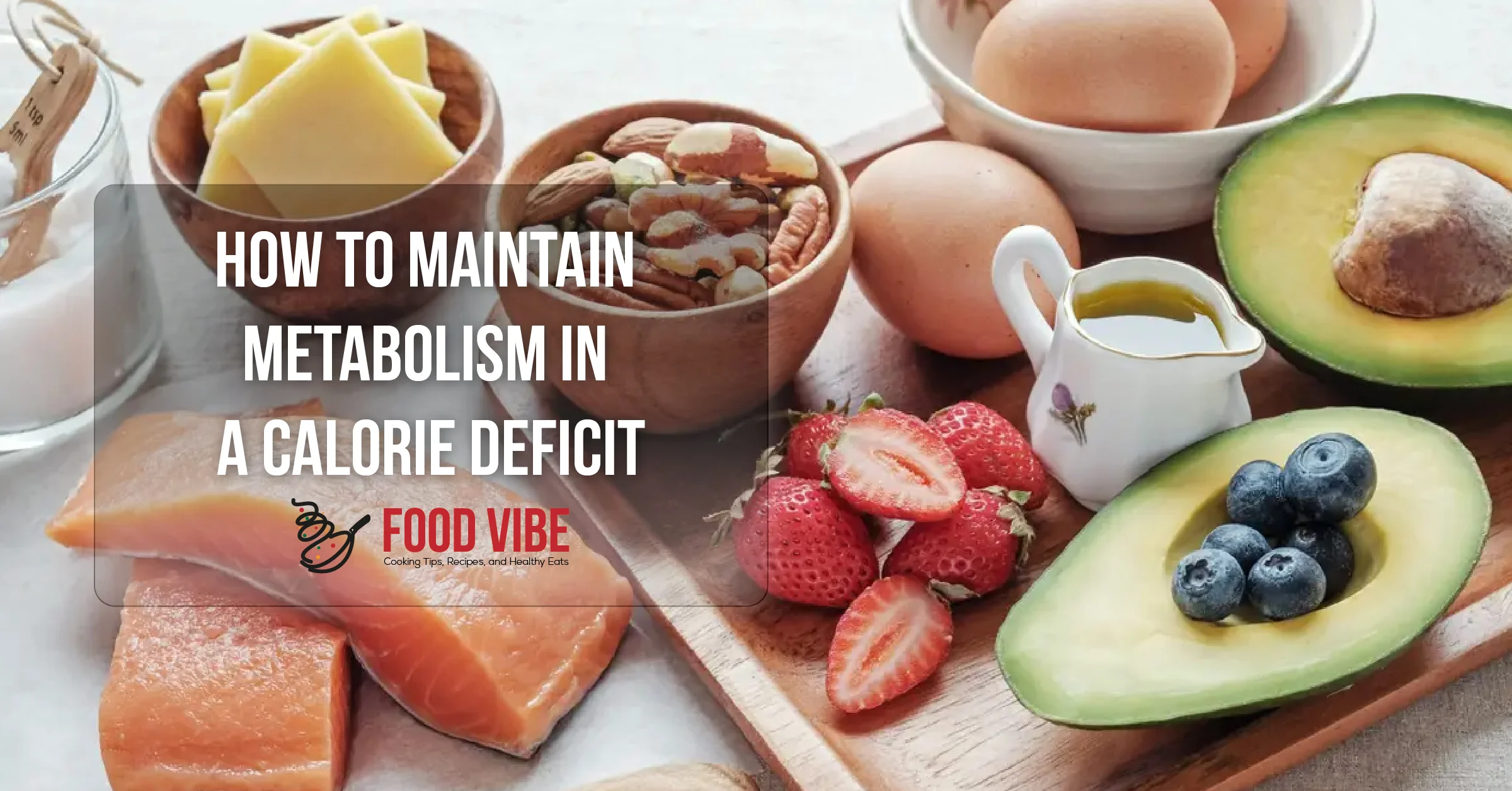How to Maintain Metabolism in a Calorie Deficit
Trying to lose weight often starts with a calorie deficit. But it’s also key to know how to keep your metabolism balanced. This ensures you lose weight in a healthy way. Your metabolism is vital for weight loss, and ignoring it can cause plateaus.
As you start your weight loss journey, think about how a calorie deficit affects your metabolism. Learning to balance your metabolism in a calorie deficit helps you make smart diet and exercise choices. This focus on metabolism and calorie deficit helps you create a plan that works for you, leading to lasting success.
Table of Contents
Understanding Your Metabolism and Calorie Deficit
To lose weight, you need to know about metabolism and nutrition. Your metabolic rate is how fast your body burns calories. To lose weight, you must eat fewer calories than you burn.
Eating a balanced diet is key to a healthy metabolism. Include fruits, veggies, whole grains, and lean proteins. Drinking plenty of water is also important for your health.
What is Metabolic Rate?
Metabolic rate is how many calories your body burns when you’re not moving. It changes based on your age, sex, and weight. Knowing your metabolic rate helps you figure out how many calories you should eat to lose weight.
The Science Behind Calorie Deficits
Creating a calorie deficit is crucial for losing weight. You can do this by eating less and moving more. Making healthy changes in your diet and lifestyle helps you lose weight and keep your metabolism balanced.
Signs of a Healthy Metabolism
A healthy metabolism means you have a stable weight, lots of energy, and feel good overall. You might also have regular bowel movements, healthy skin, and a strong immune system. Eating well and living a healthy lifestyle supports your metabolism and health.
| Signs of a Healthy Metabolism | Description |
|---|---|
| Stable Weight | Maintaining a healthy weight through a balanced diet and regular exercise |
| High Energy Levels | Having enough energy to perform daily activities without feeling fatigued |
| Regular Bowel Movements | Having regular bowel movements and a healthy digestive system |
The Impact of Calorie Restriction on Your Body
Trying to lose weight by eating fewer calories is common. But, it’s key to know how it affects your body. Eating less than your body burns leads to weight loss. Yet, eating too little can slow down your metabolism, making it harder to lose and keep off weight.
Calorie restriction has both good and bad effects. It can help you lose weight and improve blood sugar control. But, eating too little can harm your metabolism and muscle mass. It can also make you hungrier and less motivated.
To lose weight healthily, balance calorie intake with nutrients. Eat lots of fruits, veggies, whole grains, and lean proteins. Drinking water and listening to your hunger and fullness cues are also important.
Here are some tips for a healthy calorie deficit:
- Eat a balanced diet that includes plenty of fruits, vegetables, whole grains, and lean protein sources
- Stay hydrated by drinking plenty of water throughout the day
- Listen to your body’s hunger and fullness cues to avoid overeating or undereating
- Aim for a daily calorie deficit of 500-1000 calories to promote weight loss while preserving muscle mass
By following these tips, you can achieve a healthy calorie deficit. This supports weight loss and overall health. Remember, successful weight loss comes from healthy living, not just cutting calories. Sustainable lifestyle changes help you maintain a calorie deficit for better health and well-being.
| Calorie Deficit | Weight Loss | Healthy Living |
|---|---|---|
| 500-1000 calories per day | 1-2 pounds per week | Balanced diet, regular exercise, and adequate sleep |

How to Balance Your Metabolism When in a Calorie Deficit
When you’re in a calorie deficit, balancing your metabolism is key. This ensures you lose weight in a healthy way. It’s about understanding how your body reacts to fewer calories and making changes to keep your metabolism healthy. Eating foods that boost your metabolism can also help.
To find this balance, try these strategies:
- Choose nutrient-dense foods to support your metabolism, not just cut calories.
- Use regular exercise, like cardio and strength training, to help your body adjust to fewer calories.
- Eat balanced meals with protein, healthy fats, and complex carbs to time your meals right.
Regular exercise is crucial for your metabolic health. When you add it to a diet rich in metabolism-boosting foods, you can reach your weight loss goals. By focusing on these areas, you can balance your metabolism while in a calorie deficit.
| Strategy | Description |
|---|---|
| Optimal Calorie Reduction | Focusing on nutrient-dense foods to support metabolism |
| Metabolic Adaptation Management | Incorporating regular exercise to help the body adjust to calorie deficit |
| Timing Meals | Aiming for balanced meals that include protein, healthy fats, and complex carbohydrates |
Essential Nutrients for Metabolic Health
Nutrition is key to a healthy metabolism. Eating the right foods helps keep your metabolism balanced. When you’re trying to lose weight, focus on foods that give you the nutrients you need.
Protein is important for muscle health, which helps your metabolism. Healthy fats like omega-3s and MCTs also boost energy and control hunger.
Key Nutrients for Metabolic Health
- Protein: 1.6-2.2 grams per kilogram of body weight
- Healthy fats: 0.5-1 gram per kilogram of body weight
- Micronutrients: vitamin D, magnesium, and iron
Eating foods rich in these nutrients supports healthy living and a balanced metabolism. Choose whole foods over processed snacks to help control hunger and support your metabolism.
| Nutrient | Recommended Daily Intake |
|---|---|
| Protein | 1.6-2.2 grams per kilogram of body weight |
| Healthy fats | 0.5-1 gram per kilogram of body weight |
| Micronutrients | vitamin D: 600-800 IU, magnesium: 400-420 mg, iron: 8-18 mg |
Strategic Exercise for Metabolic Support
Exercise is key when you’re trying to keep your metabolism up in a calorie deficit. Exercise boosts your metabolic rate, even if you eat fewer calories. This is because it helps build and keep muscle, which burns more calories than fat.
Choosing the right exercise is important. Some top picks for boosting your metabolism include:
- Aerobic exercises, like running or cycling, which boost heart health and burn more calories
- Strength training, such as weightlifting or bodyweight exercises, which builds and keeps muscle
- High-intensity interval training (HIIT), with short, intense workouts followed by rest
Adding these exercises to your routine can help your metabolism and overall wellness, even when you’re eating fewer calories. Always listen to your body and adjust your workout plan to avoid injury or burnout. With the right mix of exercise and nutrition, you can reach your weight loss goals and keep a healthy metabolism for the long term.
| Exercise Type | Benefits |
|---|---|
| Aerobic Exercise | Improves cardiovascular health, increases calorie burn |
| Strength Training | Builds and maintains muscle mass, supports bone health |
| HIIT | Improves insulin sensitivity, increases calorie burn |

The Role of Rest and Recovery
Rest and recovery are key to a healthy metabolism, just like diet and exercise. Getting enough sleep and managing stress greatly impact your wellness and metabolism. Sleep helps your body repair, build muscle, and strengthen your immune system.
Try to sleep 7-9 hours each night to support your metabolism and health. Stress management, like meditation or yoga, also helps. By focusing on rest and recovery, you support your overall wellness.
Sleep Quality and Metabolism
Sleep quality is crucial for a healthy metabolism. It helps regulate hunger hormones, preventing overeating and weight gain. Lack of sleep can slow your metabolism, making it harder to lose weight.
Recovery Day Protocols
Recovery days are vital in any fitness plan. They help your metabolism balance. On these days, do light activities like stretching or yoga. Avoid hard workouts to let your body recover.
| Activity | Benefits |
|---|---|
| Sleep | Regulates hormones, repairs tissues, and strengthens immune system |
| Stress Management | Reduces stress, promotes relaxation, and supports metabolism balance |
| Recovery Days | Supports physical recovery, reduces muscle soreness, and promotes overall wellness |
Metabolism-Boosting Foods and Supplements
To help you lose weight and stay healthy, focus on foods and supplements that boost your metabolism. Eating a balanced diet with nutrient-rich foods can greatly improve your metabolism and health.
Lean proteins, whole grains, and fruits and vegetables are great for boosting your metabolism. They give you the nutrients you need. Adding healthy fats like nuts and seeds to your diet can also help your metabolic health.
Natural Metabolism Enhancers
Some foods and supplements naturally boost your metabolism. Green tea, for example, has catechins that can speed up your metabolism. Cayenne pepper can also help by stimulating digestion and boosting metabolism.
Citrus fruits like oranges and grapefruits are full of vitamin C. They support your immune system and overall health.
Supplement Recommendations
Adding certain supplements to your diet can also support your metabolic health. Probiotics help with gut health and immune function. Vitamin D is key for overall health and wellness.
Other supplements like conjugated linoleic acid (CLA) and garcinia cambogia may also aid in metabolism and weight loss.
| Food/Supplement | Metabolism-Boosting Effect |
|---|---|
| Green Tea | Increases metabolism through catechins |
| Cayenne Pepper | Stimulates digestion and boosts metabolism |
| Citrus Fruits | Supports immune function and overall wellness through vitamin C |
| Probiotics | Supports gut health and immune function |
| Vitamin D | Essential for overall health and wellness |
By adding these metabolism-boosting foods and supplements to your diet, you can support your wellness and reach your weight loss goals. Always talk to a healthcare professional before trying new supplements or making big changes to your diet.
Common Metabolic Mistakes to Avoid
Trying to keep your metabolism up during a calorie deficit can be tricky. One big mistake is cutting calories too much. This can slow down your metabolism, making it tough to lose weight later on.
Not exercising enough is another mistake. Exercise is key to a healthy metabolism. It helps build muscle, which boosts your metabolism and aids in weight loss. Also, bad nutrition choices can harm your body by lacking important nutrients.
- Not eating enough protein to support muscle growth and maintenance
- Consuming high amounts of processed foods and added sugars
- Not staying hydrated, which can slow down your metabolism
To avoid these errors, plan your weight loss carefully. Focus on a balanced diet, drink plenty of water, and exercise regularly. By doing this, you can keep your metabolism healthy and reach your weight loss goals.

Tracking Progress and Adjusting Your Approach
Starting your journey to lose weight and boost your metabolic health is exciting. It’s key to track your progress. This lets you see what works and what doesn’t, helping you make changes to stay on track. You’ll need to set clear goals, pick the right ways to monitor, and use tools to check your success.
There are many ways to monitor your progress. You can keep a food diary to track what you eat, use a fitness tracker to see how active you are, and take body measurements to see how your body changes. These tools help you understand your habits and find areas to get better.
Progress Assessment Tools
Here are some tools to help you assess your progress:
- Weight scale: to track changes in your body weight
- Tape measure: to monitor changes in your body measurements
- Progress photos: to visually track changes in your body composition
By using these tools regularly and making changes when needed, you can fine-tune your weight loss and healthy living plan. Remember, success comes from being consistent and patient. A good nutrition plan and regular exercise are also crucial.
Conclusion:
A balanced approach is key to keeping your metabolism in check while in a calorie deficit. By understanding your body’s needs, you can adopt the right nutrition and exercise. This way, you can lose weight in a healthy way and boost your wellness.
Remember, metabolic health is a lifelong journey, not a quick fix. Start making gradual, sustainable changes that fit into your lifestyle. With time and patience, you can keep your metabolism balance healthy. Enjoy the perks of more energy, better body shape, and overall health.
Also Read: How to Go Low-Carb Without Compromising Your Health
FAQs
What is a calorie deficit and how does it affect weight loss?
A calorie deficit occurs when you consume fewer calories than your body burns, leading to weight loss. However, it’s important to maintain a balanced metabolism to ensure healthy and sustainable results.
How can I balance my metabolism while in a calorie deficit?
To balance your metabolism, focus on nutrient-dense foods, incorporate regular exercise, and ensure proper meal timing with a mix of protein, healthy fats, and complex carbohydrates.
What are the signs of a healthy metabolism?
Signs of a healthy metabolism include stable weight, high energy levels, regular bowel movements, healthy skin, and a strong immune system.
What are the best foods to boost metabolism?
Foods like lean proteins, whole grains, fruits, vegetables, green tea, and healthy fats (e.g., nuts, and seeds) boost metabolism and support overall health.
How can I track my progress during a weight loss journey?
You can track progress using tools like a weight scale, tape measure, progress photos, and fitness trackers. Regularly monitoring these metrics helps you adjust your approach for better results.














Post Comment